Laptops enable portable computation by miniaturizing hardware components and by including a battery in the packaging to sustain power. But often, we face the issue of a laptop suddenly shutting down when it is plugged into power. Recently, I encountered this issue myself and searched through the haystacks of the internet to find solutions to my problem.
Are you someone who is also facing similar problems as me regarding automatic device shutdown?
After observing many causes and solutions, I decided to write this post to assist others struggling with this common problem. So keep reading till the end to find out the exact issue causing your computer to shut down and how to resolve it. 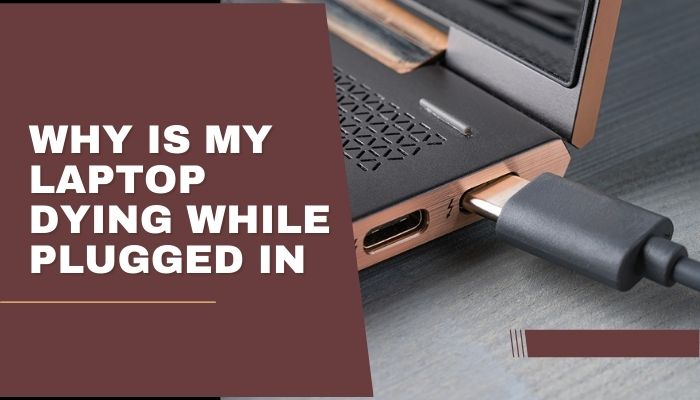
You may also like to read about how to tackle Laptop overheating issue?
Why does a laptop abruptly shut down when it is plugged in?
Your laptop can suddenly shut down for various reasons. In most cases, your laptop crashes when plugged in, most likely due to a broken power adapter, malfunctioning outlets, depleted batteries, or damaged cables and ports. This issue may also be brought on by internal problems such as a bad motherboard, HDD, SSD, or RAM.
Here are the most common reasons for which your laptop abruptly dies even when it is plugged in:
Non-functional power outlet
Although a laptop may operate for a long time on battery power, you must connect your laptop to a power outlet to recharge it. As a result, you might experience improper charging due to a bad power outlet.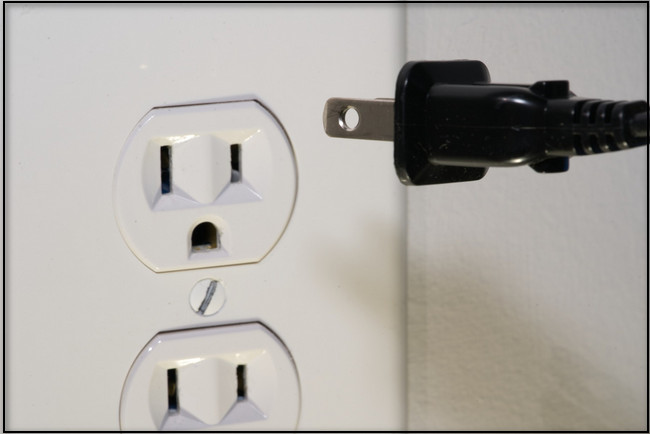
The fault might not lie in the power outlet itself. Usually, power outlets are designed to face heavy stress, and they do not easily break due to their rugged design. Therefore, a power outlet not sending power to your laptop can also happen due to faulty circuit breakers or even an actual circuit fault.
In such a case, when your laptop’s battery is empty and you are plugged into a faulty power outlet, your laptop would die instantly.
Related contents you should read about will a Laptop Charge when Shut Down?
Broken power adapter
Your device receives power from the power adapter, also referred to as a charger. Unfortunately, power cannot be transported from outlets by a defective power adaptor. As a result, the absence of electricity will cause your laptop to shut down.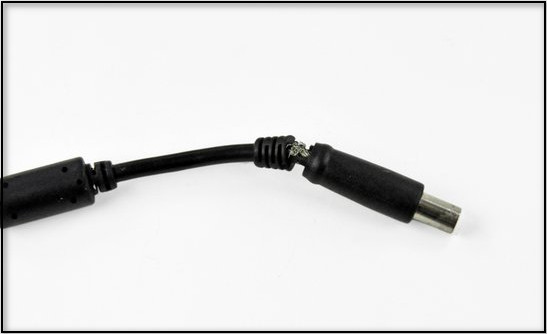
There are many reasons why a power adaptor does not perform its intended job. Your laptop won’t charge if the power adapter is broken. Some laptops help users identify adapter issues more quickly by displaying an error message. Check the charging indicator on your laptop.
For example, the sole function of the power adapter is to convert AC voltage into an acceptable DC value. So a power adapter includes a rectifier and other filtering and protective circuits, which involves a lot of electronic parts. So if any problem occurs to the internal electronics (i.e., a broken diode), your laptop will shut down even if you are plugged in.
Follow our guide about will a Laptop Hard Drive work in a Desktop?
Depleted battery
Over time, laptop batteries deteriorate naturally, and if they are worn out, the laptop may experience significant problems. It may cause the computer to overheat, become unable to retain power, or even abruptly shut down. Especially if the battery is a few years old, this response is usual.
Constantly charging a battery without giving it a chance to fully discharge is the root cause of its degradation. The battery capacity starts to degrade with time. Hence, it loses power too quickly or shuts down unexpectedly. If you use the laptop for a long time without charging it, the battery will totally deplete, which could cause charging issues (e.g., The charging indicator LED would not light up).
Experts always advise removing the laptop battery if your battery is fully charged and you want to work on your laptop while plugged in. This advice is also applicable if your laptop’s battery is fully charged but you will not use it for a long time. Removing your battery will help not to deplete all the charge stored in it.
Related guide about Can Laptops run VR and which ones?
Thermal throttling
The majority of computers feature in-built thermal protection circuitry that guards the device against the risks of overheating. Once the laptop begins to overheat, this thermal protection system turns the laptop off without any outside intervention.
Laptop overheating occurs in devices that have lower cooling power. But this is not true in all cases. For instance, if your laptop’s cooling fan becomes dusty, that would significantly reduce its cooling performance.
When a laptop overheats and shuts off, the machine won’t turn back on until it has cooled.
PMIC issues
The power management integrated circuit (PMIC) regulates power to all of the onboard components of a laptop. It controls scaling of voltages up or down, DC-to-DC conversion, battery power charging, and sleep modes.
Any issue with the PMIC can abruptly cut your laptop’s power, even while the device is in plugged condition.
For instance, the brief disconnection of the laptop power from the battery and attachment to the charger briefly simulates pulling out of the battery if the PMIC fails to smooth out the voltage drop. The system will be deprived of power for enough time, which would cause it to shut down if the capacitors are not large enough.
Some more guides on Is a Laptop Considered a PC?
Malware
Usually, laptop shutting down because of malware is very rare, as they can only operate when your computer is turned on. However, some malware variants may force a computer to restart or shut down to finish the installation process.
Computers are notoriously shut down by ransomware whenever the user tries to remove the virus. The phony Blue Screen of Death could appear to the user, which simulates a computer disaster. The computer may shut down or crash entirely if you attempt to leave the screen.
What should I do if my laptop dies while plugged in?
As mentioned earlier, the reasons for your laptop dying while connected to the charger can happen for various reasons. Hence, finding a solution for this issue would vary depending on the causes of the shutdown.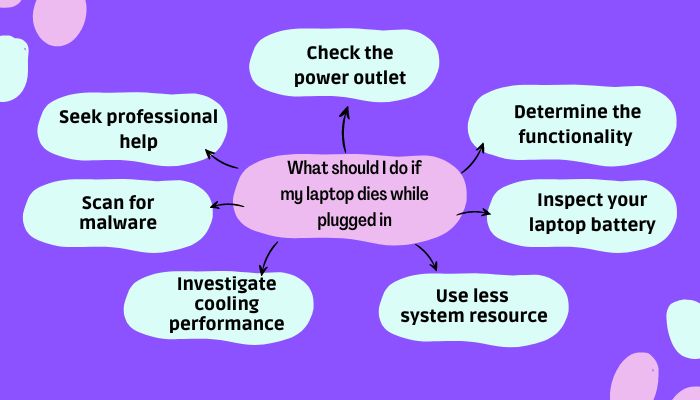
Follow the steps if your laptop dies while plugged into an electrical outlet:
1. Check the power outlet
The first thing to do is to switch on the power outlet and connect your AC-DC adapter properly to the power source. Next, ensure that the contacts are properly inserted into the power outlet. Try charging a separate gadget from the same power outlet to test whether the outlet works.
Moreover, look at the signal specifications that your power outlet can provide. It might be the case that your power outlet is operating at the same frequency or voltage level that is specified for your adapter.
Let’s assume a case where your laptop’s power adapter operates at 110V,60 Hz AC input, but your power outlet can provide 220V, 50Hz AC voltage. In this case, our laptop won’t be able to take power from the outlet due to frequency and voltage level mismatch. So using a 110V, 60 Hz power adapter is the only solution in such a case.
2. Determine the functionality and compatibility of the power adapter
Each charger is made to provide the laptop with a specific wattage. This issue could be caused by using a different charger, which might not give the proper wattage.
Typically, all laptops have one charging port. Try each of the computer’s USB-C ports to determine which works if you’re using one of the more recent models that use USB-C for charging. Always use the computer’s original charger to obtain the best charging performance.
Furthermore, you should look into the issue of connector compatibility with your laptop’s charging port. Suppose you are plugging in your laptop with a power adapter to be connected with a charging cable connector incompatible with your laptop’s charging port. In that case, your battery won’t charge from it. Hence, you must use a compatible charger to stop your laptop from shutting down.
3. Inspect your laptop battery
The most frequent cause of this issue is a bad laptop battery. The battery might become overworked over time, making the device run out of power quickly or cease functioning altogether.
To check whether your battery is causing your laptop to shut down while plugged in, follow these steps:
- Remove the battery and plug in your laptop to the power socket.
- Press the power button and see what happens.
- If the computer turns on, the battery is causing it to shut down. Otherwise, this phenomenon is not related to the battery.
Replace your laptop battery if you find out that the issue originates from there.
4. Use less system resource
Overloading your computer might also result in charging issues aside from the hardware. An overworked computer discharges more quickly than usual, which may cause power issues.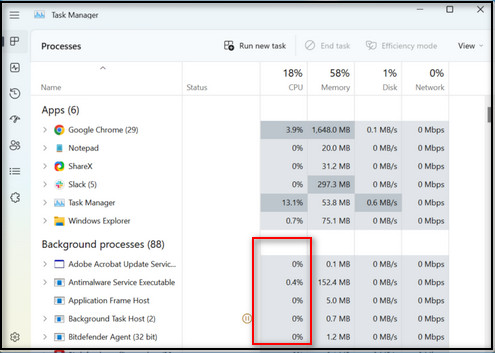
The laptop will eventually stop working if the charger isn’t supplying enough power to recharge the battery as quickly as it is discharging. If you face this issue, Keep CPU, RAM, and GPU usage below the 75% mark.
5. Investigate cooling performance
Inadequate colling is the most common reason laptops shut down abruptly while plugged into power. This can happen due to the deterioration of the cooling system with time or due to blockage of air vents.
Check and clean all air vents, cooling fan blades, and heat sinks for maximum heat transfer. Moreover, look for the quality of the thermal compounds used inside the laptop. You could also tweak fan speed control options to ensure adequate cooling, preventing your computer from sudden shutdowns.
6. Scan for malware
Scan your system with Windows defender or any other third-party antivirus software solution for any malware in your system.
If you find any malicious software or program responsible for this issue, follow the instructions in the antivirus software to remove this threat from your PC.
7. Seek professional help
If problems with PMIC or other electronic components happen, fixing that personally would be nearly impossible, especially if you are not an expert in miniaturized computer hardware.
Seeking professional help in those cases is the only wise decision that you can take.
Conclusion
The solution to the problem of your laptop shutting down while plugged in requires a multivariate analysis of different conditions faced by the device.
The most frequent cause of this issue is inadequate cooling inside the device. Remove the battery and plug your laptop into the power socket to determine whether your battery is in good condition.
Scan your system with Windows defender or any other third-party antivirus software. Seek professional help if issues with PMIC or other components prevent you from resolving this problem on your computer.



